منصات اخرى للمنظمة
يظهر هذا القسم منصات اخرى في المجال الزراعي و الأمن النذائي اللتي توفرها منظمة الاغذية و الزراعة الامم المتحدة.

The FAO corporate Policy Portal provides a single point of access to policy areas of work under the Strategic Framework, with its own thematic “landing pages” and associated Policy and Governance video series.
The FAO Policy Portal:
- focuses on key messages that are useful for policy experts who need to engage in high-level policy dialogue;
- presents the diversity of FAO’s policy work and show how the Organization engages in policy processes at multiple levels.
 The Committee on World Food Security (CFS) is the foremost inclusive international and intergovernmental platform for all stakeholders to work together to ensure food security and nutrition for all. Using a multi-stakeholder, inclusive approach, CFS develops and endorses policy recommendations and guidance on a wide range of food security and nutrition topics.
The Committee on World Food Security (CFS) is the foremost inclusive international and intergovernmental platform for all stakeholders to work together to ensure food security and nutrition for all. Using a multi-stakeholder, inclusive approach, CFS develops and endorses policy recommendations and guidance on a wide range of food security and nutrition topics.
 The Community of Practice (CoP) on food loss reduction serves as a global convener and an integrator of knowledge related to post-harvest loss (PHL) reduction. It offers a platform to facilitate linkages and information sharing amongst stakeholders and relevant networks, projects and programs in the framework of the Save Food global initiative. The CoP website includes background information, relevant news, events, online discussions, resources, and links to partners.
The Community of Practice (CoP) on food loss reduction serves as a global convener and an integrator of knowledge related to post-harvest loss (PHL) reduction. It offers a platform to facilitate linkages and information sharing amongst stakeholders and relevant networks, projects and programs in the framework of the Save Food global initiative. The CoP website includes background information, relevant news, events, online discussions, resources, and links to partners.
 The website is a one-stop-source providing essential information, news and resources on decent rural employment, including learning material, multimedia products, and sector-specific publications that shed light on key aspects of the issue. Relevant resources are made easily accessible through the search feature and a user-friendly navigation structure.
The website is a one-stop-source providing essential information, news and resources on decent rural employment, including learning material, multimedia products, and sector-specific publications that shed light on key aspects of the issue. Relevant resources are made easily accessible through the search feature and a user-friendly navigation structure.
 The FAO Global Information and Early Warning System (GIEWS) Earth Observation System monitors satellite-based rainfall estimation and vegetation conditions across the globe in Near-Real Time to support assessment of production prospects of major foodcrops. The system includes the Agricultural Stress Index (ASI), a quick-look indicator for early identification of agricultural areas probably affected by dry spells, or drought in extreme cases. The system provides latest products online every dekad (ten-day period).
The FAO Global Information and Early Warning System (GIEWS) Earth Observation System monitors satellite-based rainfall estimation and vegetation conditions across the globe in Near-Real Time to support assessment of production prospects of major foodcrops. The system includes the Agricultural Stress Index (ASI), a quick-look indicator for early identification of agricultural areas probably affected by dry spells, or drought in extreme cases. The system provides latest products online every dekad (ten-day period).
 The Family Farming Knowledge Platform gathers digitized quality information on family farming from all over the world; including national laws and regulations, public policies, best practices, relevant data and statistics, researches, articles and publications. It therefore integrates and systematizes existing information to better inform and provide knowledge-based assistance to policy-makers, family farmers’ organizations, development experts, as well as to stakeholders in the field and at the grassroots level.
The Family Farming Knowledge Platform gathers digitized quality information on family farming from all over the world; including national laws and regulations, public policies, best practices, relevant data and statistics, researches, articles and publications. It therefore integrates and systematizes existing information to better inform and provide knowledge-based assistance to policy-makers, family farmers’ organizations, development experts, as well as to stakeholders in the field and at the grassroots level.
 The FAO GM Foods Platform is an online platform to share information on safety assessment of GM foods conducted in accordance with the relevant Codex Guidelines. The Platform also facilitates the effective utilization of food safety assessment in situations of Low Level Presence of r-DNA plant materials in food.
The FAO GM Foods Platform is an online platform to share information on safety assessment of GM foods conducted in accordance with the relevant Codex Guidelines. The Platform also facilitates the effective utilization of food safety assessment in situations of Low Level Presence of r-DNA plant materials in food.
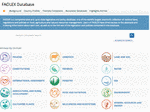
FAOLEX is a comprehensive and up-to-date legislative and policy database, one of the world's largest electronic collection of national laws, regulations and policies on food, agriculture and natural resources management.
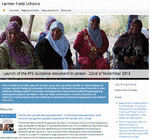 The platform has been created to give space to all actors involved in FFS globally as to allow for exchange of information and improved quality and efficiency of FFS activities. It will include, among others, background information on FFS, regional pages showcasing regional activities, a knowledge repository, a global roster of FFS experts and a partners’ page.
The platform has been created to give space to all actors involved in FFS globally as to allow for exchange of information and improved quality and efficiency of FFS activities. It will include, among others, background information on FFS, regional pages showcasing regional activities, a knowledge repository, a global roster of FFS experts and a partners’ page.
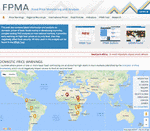 The FAO Global Information and Early Warning System (GIEWS) Food Price Monitoring and Analysis (FPMA) Tool, is an advanced online application for monitoring, analysis and dissemination of price data. GIEWS maintains a global version of the Tool, with data on latest available domestic food prices in 90 countries as well as many international benchmark trade price series.
The FAO Global Information and Early Warning System (GIEWS) Food Price Monitoring and Analysis (FPMA) Tool, is an advanced online application for monitoring, analysis and dissemination of price data. GIEWS maintains a global version of the Tool, with data on latest available domestic food prices in 90 countries as well as many international benchmark trade price series.
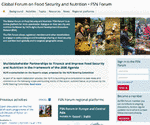 The FSN Forum is an online platform for multi-stakeholder dialogue on food security and nutrition facilitated by FAO. It allows registered members and other stakeholders to engage in policy dialogue and knowledge sharing on food security and nutrition both globally and in targeted geographic areas.
The FSN Forum is an online platform for multi-stakeholder dialogue on food security and nutrition facilitated by FAO. It allows registered members and other stakeholders to engage in policy dialogue and knowledge sharing on food security and nutrition both globally and in targeted geographic areas.
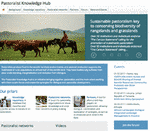 The Pastoralist Knowledge Hub serves as a comprehensive platform bringing pastoralist networks and international actors together to create synergies for dialogue on pastoralist development. The Hub gives access to knowledge, news, events and networks in the field of pastoralism and works closely together with pastoralist networks and organizations supporting them.
The Pastoralist Knowledge Hub serves as a comprehensive platform bringing pastoralist networks and international actors together to create synergies for dialogue on pastoralist development. The Hub gives access to knowledge, news, events and networks in the field of pastoralism and works closely together with pastoralist networks and organizations supporting them.
 The SFVC knowledge platform is a global platform that provides a user-friendly gateway to practical guidance and information on the development of sustainable food value chains. Underpinning the platform is a community of members, which facilitates networking and the exchange of ideas, materials and knowledge products among policy-makers, project designers, field practitioners and other people working on topics related to sustainable food value chains. The platform provides a library of downloadable publications, a training and learning centre, news and events section and a space for member discussions and exchange.
The SFVC knowledge platform is a global platform that provides a user-friendly gateway to practical guidance and information on the development of sustainable food value chains. Underpinning the platform is a community of members, which facilitates networking and the exchange of ideas, materials and knowledge products among policy-makers, project designers, field practitioners and other people working on topics related to sustainable food value chains. The platform provides a library of downloadable publications, a training and learning centre, news and events section and a space for member discussions and exchange.
 TECA is FAO’s online platform for the exchange of agricultural practices and technologies for smallholder farmers. The TECA Knowledge base contains a wide range practices that can help smallholder farmers to strengthen their livelihood. Information is available in English, French and Spanish and is brought in a non-academic, easy to understand language and well-illustrated to facilitate the adoption of the practices by farmers. In the TECA Exchange Groups farmers, extension workers, scientists, students and other people interested in a specific topic can virtually meet to discuss about and find solutions for their challenges.
TECA is FAO’s online platform for the exchange of agricultural practices and technologies for smallholder farmers. The TECA Knowledge base contains a wide range practices that can help smallholder farmers to strengthen their livelihood. Information is available in English, French and Spanish and is brought in a non-academic, easy to understand language and well-illustrated to facilitate the adoption of the practices by farmers. In the TECA Exchange Groups farmers, extension workers, scientists, students and other people interested in a specific topic can virtually meet to discuss about and find solutions for their challenges.
The Right to Food around the Globe is a database developed to provide one-stop, easily accessible platform where what is constitutionally committed to on the right to adequate food at the national level can be found. For each FAO Member Nation, you will find quotes of articles from national constitutions relevant for the realization of the right to adequate food as well as the ratification status of some key international instruments. The tool also provides links to relevant instruments, texts of constitutions, as well as
informative websites.

The Urban Food Actions Platform is a partnership between FAO, the Milan Urban Food Policy Pact (MUFPP) Secretariat, and international networks of local and regional governments: C40, ICLEI-RUAF, ORU-Fogar and UCLG. It provides access to a comprehensive database of FAO and non-FAO resources related to urban food policies and programmes in a wide range of aspects: governance and planning, sustainable diets and nutrition, social and economic equity, food production and ecosystem management, food supply and distribution, food loss and waste. The Platform is designed for a wide range of actors, including policy makers, practitioners, non-governmental organizations, researchers, producers’ organizations, developmental agencies and the private sector, who are directly engaged in the promotion, development and implementation of food policies, actions and evidence gathering at urban and peri-urban levels, including rural-urban linkages for food security and sustainability.
